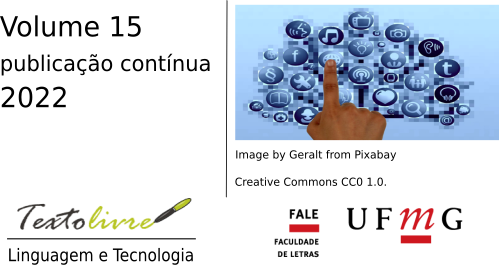Letramento digital
breve revisão bibliográfica do limiar entre conceitos e concepções de professoras e de professores
DOI:
https://doi.org/10.35699/1983-3652.2022.40207Palavras-chave:
Letramento digital, Práticas acadêmicas, Práticas socioescolaresResumo
Apesar de o termo Letramento Digital estar em voga e ser recorrentemente citado nas mais diversas práticas sociais, muito ainda há para se discutir sobre o conceito, já que ele próprio se modifica na fluidez em que se configuram os ambientes digitais. Este artigo tem como objetivo, pois, dialogar sobre as definições acerta de tal termo, tanto as produzidas no campo acadêmico, por teóricas e teóricos, quanto no espaço socioescolar, por professoras e por professores em formação e em exercício, de diferentes realidades geopolíticas – Estados Unidos, Indonésia e Brasil –, a fim de evidenciar aproximações e afastamentos entre o teórico e o prático. O estudo fornece uma breve revisão bibliográfica sobre o tema. A análise é realizada de maneira qualitativo-interpretativista. Os dados foram extraídos de artigos teóricos e cruzados entre si para interpretação e discussão. Os resultados demonstraram que as definições sobre Letramento Digital produzidas por professoras e por professores são pouco complexas, principalmente no Brasil, sintetizadas, muitas vezes, pelas ferramentas digitais, e não pelo seu uso consciente e crítico, bem como pelo seu potencial socioemocional.
Downloads
Referências
AILLERIE, K. Teenagers’ information practices in academic settings: What relevance for a transliteracy-based approach? Journal of Librarianship and Information Science, v. 51, n. 3, p. 737–745, 2019. ISSN 0961-0006. DOI: 10.1177/0961000617742463. Disponível em: https://journals.scholarsportal.info/details/09610006/v51i0003/737_tipiaswrfata.xml. Acesso em: 3 out. 2022.
ALCÂNTARA, L. M. de. Ciberativismo e movimentos sociais: mapeando discussões. Aurora., v. 8, n. 23, p. 73–97, 2015. ISSN 1982-6672. Disponível em: https://revistas.pucsp.br/index.php/aurora/article/view/22474. Acesso em: 3 out. 2022.
ARAÚJO, W. Ciberativismo: levantamento do estado da arte na pesquisa no Brasil. In: ANAIS. Florianópolis: [s.n.], 2011. p. 1–14.
BRASIL. Ministério da Educação. Base Nacional Comum Curricular. [S.l.: s.n.], 2018.
CHOULIARAKI, L.; FAIRCLOUGH, N. Discourse in Late Modernity: Rethinking Critical Discourse Analysis. Place of publication not identified: Edinburgh University Press, 1999. ISBN 9780585441979.
DUDENEY, G.; HOCLY, N.; PEGRUM, M. Letramentos digitais. Tradução: M. Marcionilo. São Paulo: Parábola, 2016.
GLISTER, P. Digital Literacy. New York: John Wiley & Sons, 1997.
GOURLAY, L.; HAMILTON, M.; LEA, M. R. Textual practices in the new media digital landscape: messing with digital literacies. Research in Learning Technology, v. 21, jan. 2014. ISSN 2156-7077, 2156-7069. DOI: 10.3402/rlt.v21.21438. Disponível em: https://journal.alt.ac.uk/index.php/rlt/article/view/1442. Acesso em: 3 out. 2022.
HERRING, J. The Internet and information skills: a guide for teachers and school librarians. London: Facet, 2004.
LANKSHEAR, C.; KNOBEL, M. (Ed.). Digital literacies: concepts, policies and practices. New York: Peter Lang, 2008. (New literacies and digital epistemologies, vol. 30). ISBN 9781433101694 9781433101687.
LIMA, Y. Forma e função em gêneros digitais: estrutura composicional e traços léxico-gramaticais no macrogênero blog. 2017. Dissertação (Mestrado em Linguística) – Universidade Federal do Rio de Janeiro, Rio de Janeiro, Rio de Janeiro.
LIST, A.; BRANTE, E.; KLEE, H. A framework of pre-service teachers’ conceptions about digital literacy: Comparing the United States and Sweden. Computers & Education, v. 148, p. 103788, abr. 2020. ISSN 03601315. DOI: 10.1016/j.compedu.2019.103788. Disponível em: https://linkinghub.elsevier.com/retrieve/pii/S0360131519303380. Acesso em: 3 out. 2022.
MARCUSCHI, L. A. O hipertexto como um novo espaço de escrita em sala de aula. Revista Linguagem & Ensino, v. 4, n. 1, p. 79–111, 2001. ISSN 1983-2400. DOI: 10.15210/rle.v4i1.15529. Disponível em: https://periodicos.ufpel.edu.br/ojs2/index.php/rle/article/view/15529. Acesso em: 3 out. 2022.
MARCUSHI, L. A. Hipertexto e generos digitais: novas formas de construcao de sentido. 2. ed. Rio de Janeiro, RJ: Lucerna, 2005. ISBN 9788586930362.
NABHAN, S. Pre-service teachers’ conceptions and competences on digital literacy in an efl academic writing setting. Indonesian Journal of Applied Linguistics, v. 11, n. 1, jun. 2021. ISSN 2502-6747, 2301-9468. DOI: 10.17509/ijal.v11i1.34628. Disponível em: https://ejournal.upi.edu/index.php/IJAL/article/view/34628. Acesso em: 3 out. 2022.
RAMALHO, V.; RESENDE, V. de M. Análise de discurso (para a) crítica: o texto como material de pesquisa. Campinas, SP: Pontes Ed, 2011. (Linguagem e sociedade, 1). ISBN 9788571133365.
REZENDE, M. O conceito de letramento digital e suas implicações pedagógicas. Texto Livre: Linguagem e Tecnologia, v. 9, n. 1, p. 94–107, jul. 2016. ISSN 1983-3652. DOI: 10.17851/1983-3652.9.1.94-107. Disponível em: https://periodicos.ufmg.br/index.php/textolivre/article/view/16716. Acesso em: 3 out. 2022.
SANTOS, K.; COSTA, C. Letramento digital e ensino de inglês. fólio - Revista de Letras, v. 10, n. 2, fev. 2018. ISSN 2176-4182. DOI: 10.22481/folio.v2i10.4300. Disponível em: http://periodicos2.uesb.br/index.php/folio/article/view/4300. Acesso em: 3 out. 2022.
SANTOS, K.; LACERDA, N. O letramento digital na prática docente do professor de língua portuguesa no ensino fundamental. Revista Ininga, v. 4, n. 1, p. 72–92, 2017.
TAGATA, W.; RIBAS, F. Rethinking Digital Literacy Practices and Educational Agendas in Times of Covid-19 Uncertainty. en. Revista Brasileira de Linguística Aplicada, v. 21, p. 399–431, mai. 2021. ISSN 1984-6398. DOI: 10.1590/1984-6398202117285. Disponível em: http://www.scielo.br/j/rbla/a/GQRmTb9Z5ZzkjjxrpWvn66H/. Acesso em: 3 out. 2022.
XAVIER, A.. C. Reflexões em torno da escrita nos novos gêneros digitais da internet. pt. Revista Investigações, v. 18, n. 2, jul. 2005. ISSN 2175-294X. Disponível em: https://periodicos.ufpe.br/revistas/INV/article/view/1484. Acesso em: 3 out. 2022.
Downloads
Publicado
Edição
Seção
Licença
Copyright (c) 2022 Newton Vieira Lima Neto, Alexandra Bittencourt de Carvalho

Este trabalho está licenciado sob uma licença Creative Commons Attribution 4.0 International License.
Este é um artigo em acesso aberto que permite o uso irrestrito, a distribuição e reprodução em qualquer meio desde que o artigo original seja devidamente citado.











